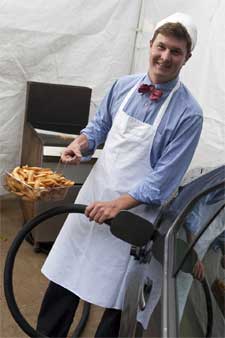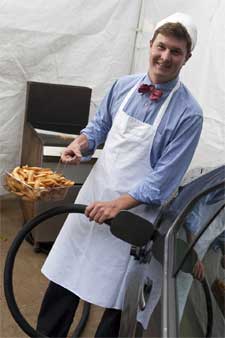 North Providence resident builds biodiesel lab, supports bond question #2
North Providence resident builds biodiesel lab, supports bond question #2
KINGSTON, R.I. – October 12, 2010 — Know what Mike Bailey pays for gas? About as much as an order of French fries. That’s because this University of Rhode Island senior spends his time in the environmental chemistry labs at URI converting cooking waste oil into biodiesel fuel that he actually uses in his own diesel car.
Not only that, but it also powers the equipment used by URI’s facilities department, helping the University reduce its overall carbon footprint.
A North Providence resident, Bailey transferred to the University of Rhode Island from another New England university, attracted to its established environmental chemistry program. Once on campus, he discovered Professors Brett Lucht and Brenton DeBeouf and the opportunity to help them start a biodiesel lab from the ground up. The reactor he built, which he says looks like a hot water heater and a cone tank, uses methanol and a catalyst to break triglycerides in cooking oil down into biodiesel and glycerol.
The biodiesel is very similar to diesel fuel and can be used in any diesel engine, while the glycerol can be used in fertilizers, soaps, wastewater treatment and other applications. Once the reactor was built and fine-tuned, Bailey personally collected used oil from URI’s dining halls, brought it to his lab for conversion, delivered the converted biodiesel to the URI facilities crew where it’s poured into lawn mowers, tractors, and pick-up trucks, and watched them run.
It’s the kind of experiential learning that helped Bailey discover his passion for environmental chemistry and land a job at Newport Biodiesel, a local company that does the same thing on a much, much larger scale for all of Rhode Island. It’s also the kind of experiential learning he believes every student should get at URI, but can’t, because labs are too small to incorporate more human bodies, and there aren’t enough labs or modern equipment to support hands-on opportunities for all the students.
“Graduates who enter the workforce without hands-on experience with state-of-the-art equipment required in today’s marketplace are at a starting line 20 yards behind everyone else,” he said.
Bailey also sees the practical value of environment chemistry on the Rhode Island economy.
“There are lots of start-up companies here with great ideas for alternative fuels, conversion of various waste products for fuel, and reducing the state’s carbon footprint overall. If we can grow our in-state chemistry resources and capabilities through these start-up companies, we can stimulate the local economy and create more jobs that we desperately need,” he said.
Rhode Island voters are being asked to support a new Center for Chemical and Forensic Sciences at the University of Rhode Island on November 2. Vote “YES” on Question 2. It’s essential to Rhode Island’s future.
Pictured above
Mike Bailey
URI Department of Communications & Marketing photo by Joe Giblin

